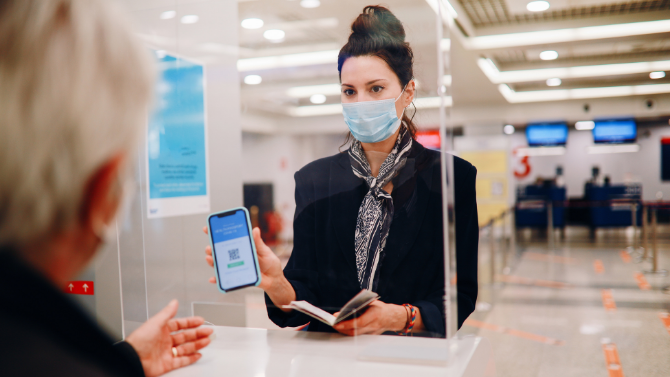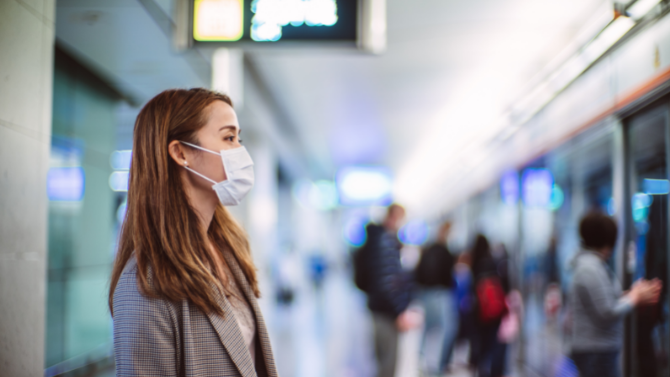
Travel safety tips for business travellers: keep your employees safe, secure, and confident while travelling.
It has been almost two years since the global pandemic brought business travel to a halt. As governments roll out mass vaccination programs and restrictions slowly start to lift, many organisations are dusting off their corporate travel policies and gearing up for business travel during uncertain times.
Safety has always been paramount, but for business travel in 2021 (and the foreseeable future), there’s more pressure than ever to ensure business travellers are safe, well and supported at every step of the journey. That requires robust, agile corporate travel safety and security procedures that not only effectively identify and mitigate risk factors, but also deliver on duty of care.
Travel safety tips for keeping staff safe before, during and after a trip:
1. Business travel safety – why does it matter?
2. Duty of care - business travel safety policy, risk management
3. Travel safety tips for business travellers
4. Preparing employees for travel – safety during business travel
5. Leverage real-time data – stay informed, stay safe
6. Safeguarding the lives of your business travellers – how travel management companies can help
Let's help with your travel program
Tell us where you're going, we'll get you there. We're dedicated to making your corporate travel experience simpler, faster and easier.
1. Business travel safety – why does it matter?
Business travel comes with a myriad of benefits for organisations, most of which have a positive effect on their bottom line. However, travelling to and operating in unfamiliar environments and situations don’t come without risks, which can endanger the outcome of a trip and, more importantly, the safety of those travelling.
Moreover, the global effects of COVID-19 have exacerbated the security, political, operational and medical risks of many countries (both developed and developing), on top of risks that existed pre-pandemic.
In other words, global travel risks are now far more complex, and with that comes uncertainty and hesitancy even in the most seasoned business travellers. Now, more than ever, organisations must be able to demonstrate their commitment to employee safety with robust contingency measures for disaster management, because of the influence it’ll have over many travel decisions in the future.
“Coming out of COVID, I think there’s a common belief that organisations will spend less on business travel. So, when they do fly, it will be for good reason, increasing the importance of corporate travel, and further escalating duty of care,” says Nick Queale, Corporate Traveller NZ General Manager.
2. Duty of care - business travel safety policy, risk management
Every business has a legal and moral responsibility to take care of its corporate travellers. Often confused with travel risk management, duty of care is what you need to do to keep your employees safe and secure. Risk management is the action plan that provides that care.
In the wake of COVID-19, not having a duty-of-care policy isn’t an option. Not only does a duty-of-care policy help avoid problems should an incident occur, but it’s also critical to improving staff satisfaction, retention and productivity.
Duty of care is about building a culture of safety and trust, so employees can feel safe and empowered to return to business travel. Without adequate support and open, genuine communication about your employees’ safety and security, you’ll struggle to gain their trust.
Realign your business travel policy
The best way to ensure corporate travel security is to develop a comprehensive travel safety policy that outlines procedures, resources and training. Duty of care must take centre stage – prioritising the health and safety of your people will win their trust and confidence to reengage with business travel.
“Travel policies need to be reviewed to ensure they are current and provide for business travellers’ health and safety, as well as what the business wants to achieve,” says Corporate Traveller’s Head of Engagement Andy Jack.
Some key features for the safety policy include:
- Responsibilities related to business travel and employee safety
- Risk assessments for all potential travel locations
- Pre-trip training and an employee-readiness checklist
- Emergency response plan and communication procedures
Once you’ve got your corporate travel safety policy, you must regularly review and edit it to keep pace with the ever-evolving changes in travel requirements and ensure optimal coverage of each business traveller’s safety and security.
“That's the benefit and beauty of having a travel management company. When the NZ government announced an immediate Alert Level 4 nationwide lockdown on 17 August 2021, in just over 24 hours we responded to 1148 customer phone calls and 648 after-hours calls, tracked over 11,000 travellers and amended more than 2500 bookings. We were able to scale up our teams to ensure our customers had the support network they needed to follow their travel policies and meet traveller safety needs,” Andy says.

Assessing the risks: travel risk management
When planning business travel, travel risk assessments to identify specific threats are essential to ensure ongoing traveller safety. By nature, travel risks are constantly changing and while the world is still battling a pandemic, they’re bound to fluctuate even more.
Effective travel risk management is an ongoing process that goes beyond assessing risks before your business travellers leave. That’s where a travel management company can provide greater transparency and improved safety and security.
“We have tools that will save you time and money including solutions for duty of care, travel policies and visibility of what and how your corporate travellers are spending,” explains Andy.
“But also, if we find out there has been a COVID-19 outbreak at a hotel, for example, we make sure you have that information so that booking and approving travel is as easy as possible, giving the business and its travellers peace of mind before and during a trip.”
3. Travel safety tips for business travellers
Let’s look at some typical risk scenarios and what you can do to avoid them, or alleviate any stress or confusion.
Sanitation, health, and medical support
While it’s difficult to predict health issues, you can plan how to manage them in advance. Here are some things to consider:
- Key contact information. Before business travellers leave, make sure they know where to go if they require medical attention. That way, if something does happen wherever they are, they’ll know what to do. Cover-More is our travel insurance partner who have a global network, and therefore access to health care professionals worldwide to assist you in finding the highest quality of care.
- Food and water safety. Some countries don’t have the hygiene standards of many developed countries, so it’s often recommended that travellers opt for bottled water and avoid street food (particularly meat) to avoid contracting any foreign bugs.
- Vaccinations. “Vaccination status is another lens that businesses will need – to plan for and understand the cost implications of not having the correct documentation,” Nick says. Many countries now require travellers to be fully vaccinated against COVID-19 or provide a negative PCR test to enter the country. “Through our Traveller Hub, you can access the latest info on where mask-wearing, tests and vaccine certificates are required. While that need is simplistic now with domestic travel, it will grow as businesses begin to travel further afield again,” Andy adds.
- Health insurance. Good business travel insurance including adequate health cover is imperative, especially in the context of COVID. However, some insurance providers require travellers to be fully vaccinated and others may not cover certain expenses in the case of an outbreak, so you must know insurance provider does and does not cover before any of your corporate travellers hit the road.
Political instability or unrest
Business travel to and within areas that are politically unstable needs careful planning based on up-to-date advice and information, to ensure travel plans and travellers aren’t endangered. For example, websites of relevant governmental institutions notify, at a global level, information in terms of security, protection and level of terrorist threat. Corporate Traveller's YOUR.CT platform posts global alerts and restrictions, and travellers using CT Mobile will receive push notifications if their is an significant alert or event that will likely impact a travellers' plans.

Accommodation security
There are plenty of business travellers who have had luggage stolen from hotel rooms, but COVID-19 adds another layer of complexity. That’s why we’ve added more advanced accommodation filters in Savi to quickly identify “free cancellation” options for bookings that will not incur a penalty if a trip needs to be cancelled, supplemented with enhanced accommodation safety and cleanliness information.
“We can identify and collect hotels that are part of clean hotel initiatives, with strict health and hygiene practices to ensure you’re booking safe accommodation,” Andy says.
For safety wherever you’re staying, follow these key tips:
- Do your research. Find out what the security measures and cleaning standards are at your accommodation.
- Don’t book ground floor rooms. They’re more susceptible to break-ins.
- Use your “do not disturb” sign. Put it on the door when you leave the room, so it looks like you haven’t left.
- Know your emergency exit plan. As soon as you arrive at your room, spend a few minutes studying the emergency exit map to determine where exits are located.
Female traveller safety
It has been reported that 83% of women have had concerns about their safety while on a business trip, yet only 18% of travel policies specifically address female safety. While the safety of all business travellers is important, the unfortunate reality is women can face more challenges than their male counterparts while travelling for work.
Corporate Traveller’s TravelSMART programme will help you get more value from your travel, and give you the confidence of booking with partners and suppliers that have been well-vetted for security. Also, mobile apps and notifications give female travellers assurance that help is always just a click away.
Third-party contractors
Your duty-of-care obligations extend beyond your employees to cover other people your company may have responsibilities towards – third-party contractors. They may also pose new risk elements which must be assessed. Using trusted third parties who have been thoroughly audited (especially overseas) is recommended.
Adverse weather conditions
Natural disasters like floods, earthquakes and hurricanes can happen at any time and, in some countries, they’re more common than you might think. Business travellers must be prepared, with weather warnings in real-time and an emergency plan should they get stuck in transit or in a foreign country.
4. Preparing employees for travel – safety during business travel
Once you’ve assessed all business travel risks, it’s critical to inspire a travel safety culture within your organisation. You may not be able to foresee incidents, but you can educate and train your staff in travel preparation and safety while on a business trip.
- Education is key. Focus employee training on prevention to avoid (rather than resolve) dangerous situations, as well as how to respond and behave if something unexpected happens. Also, make sure business travellers have access to your company’s travel policy. “For our customers, we have created one-page travel policies – a simple infographic that sets out how your organisation manages business travel can be very effective in driving engagement and ownership, as well as more accessible and easier to digest especially in times of heightened stress,” Andy explains.
- Prep your team. Make sure your team keeps an eye on the company’s bookings to weed out any high-risk or out-of-policy travel plans. Before travellers set out, ensure you have contact information for their next of kin and any clients or business partners they will be meeting during their trip. Finally, set up travel alerts to keep your travellers and travel team informed of any potential disruption.

Best practice COVID-19 hygiene habits
- Get tested. While some airlines may not require a test to fly, it’s best to get yourself tested to ensure you’re not a carrier. If you’re exhibiting even mild signs of illness and cannot provide a report showing you’re not infected, you might not be able to travel. Make sure you have the right travel documentation to avoid any complications with boarding your flight.
- Prepare for limited airport amenities. Many airports are operating at limited capacity, so to avoid waiting until you reach your destination for something to eat, prepare for unexpected closures during COVID-19 and pack the food you’ll need to get you through your travels.
- Bring hand sanitiser. Many airlines and airports have strict personal and corporate travel safety routines, and intensive cleaning procedures have been implemented both on the ground and in the air. However, it doesn’t hurt to carry hand sanitiser and antibacterial wipes to clean other areas you might come across while travelling.
- Know before you go. Look into your airlines, hotels and ground transportation to discover what precautions they’re taking to keep you safe. Some airlines are booking full flights while others are keeping the middle space free.
- Don’t travel if you’re feeling unwell. Protect yourself and others by not flying when you’re sick. An increasing number of airports are taking passengers’ temperatures, so even if your fever is unrelated to COVID-19, you might not be able to board.
- Follow the COVID-19 safety guidelines. Social distancing, washing your hands regularly and wearing a mask for extra protection will help you and others stay safe while travelling.
5. Leverage real-time data – stay informed, stay safe
Planning future travel can feel like flying through a fog of uncertainty, which makes it even more important for businesses to leverage real-time data, with that COVID lens, to inform their decision-making.
“Historically, we’ve seen the status of COVID outbreaks in a country change incredibly fast – we’ve even had it change while a business traveller is still flying. So particularly for the short to medium-term, live updates will be critical to making real-time decisions on whether someone should be travelling to a certain country,” Nick says.
“We have an online tool, customised to our customers’ travel needs, that feeds in live inventory from air, hotel and car suppliers. It's quick and efficient, so you're not flitting from one site to the next, saving you time and increasing the efficiency of your travel programme,” explains Andy.
Itinerary tracking and traveller location
During an incident, your priority is knowing exactly where your people are at any given time. Technology has been a powerful lever for change in the business travel industry, with location-tracking apps and mobile safety features providing businesses with a way of keeping tabs on their corporate travellers.
“From a flight delay or disruption to a local crisis alert, these push notifications are powerful because they give travellers that awareness they need to plan accordingly. Even something as simple as being able to take a photo of a traveller’s pre-departure COVID test and attaching that to the trip’s itinerary will make things a lot simpler for the traveller,” Andy explains.
6. Safeguarding the lives of your business travellers – how travel management companies can help
Businesses must empower their people with the resources and tools they need to stay safe while travelling and fulfil their duty of care to their business travellers.
Corporate Traveller can help travel managers put security guidelines into practice and keep travellers informed in real-time of events and developments around the world, alongside monitoring travel budgets and how to save money on business travel by incorporating corporate travel technology.
The future of travel management companies and the safety of business travellers are closely-aligned, Andy says. Smart technology is the key to corporate travel managers keeping their people safe while ensuring business expenses remain low.
“Using AI-inspired booking tool Savi with machine learning, alongside Corporate Traveller’s Mobile App, travel managers and business travellers can book online, track policy compliance, view travel itineraries, access border health and hygiene information and receive alerts on any major incidents.”